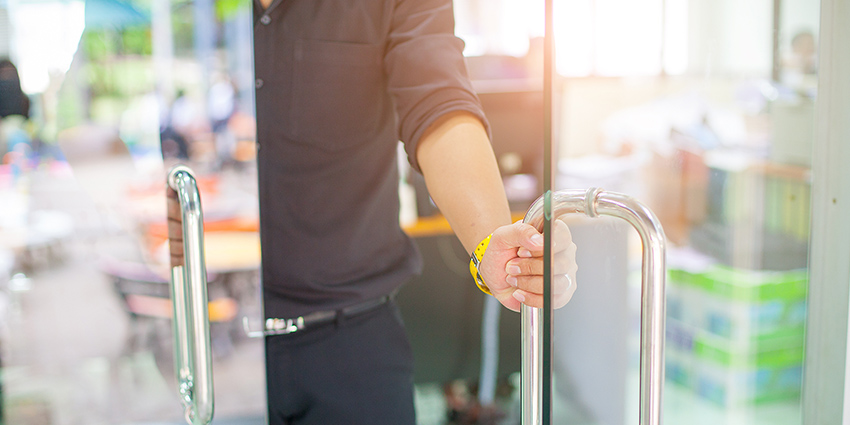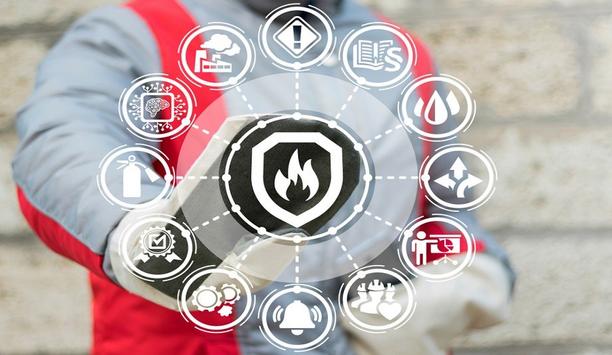Through this pandemic, many technologies have leapt into our day-to-day lives of lockdown and working from home, becoming an absolute necessity, as opposed to an alternative reserved for the young and tech-savvy.
Whether it’s conference call platforms, social media, multimedia mediums or internet shopping, we are now relying on these technologies for everything. They are keeping businesses moving, they’re putting food on our tables and they are helping us keep in touch with our loved ones. Technology has become our friend and, in some cases, our saviour.
The Door Handle Contamination Dilemma
Whether it’s conference call platforms, social media, multimedia mediums or internet shopping, we are now relying on these technologies for everything
There is a lot we don’t yet know about COVID-19. What we do know is that like common respiratory viruses, including flu, COVID-19 is spread in tiny droplets released from the nose and mouth of an infected person when they cough or sneeze.
The greatest risk comes from contamination from touched surfaces where the infection can be passed from one to another.
A shared surface such as a door handle quickly becomes a hazard and government advice has included regular disinfection of regularly touched objects and surfaces to reduce the risk of passing on the infection.
Fire Door Technology Is Combatting COVID-19
Fireco, a technology company based in Brighton, England, has been working for over twenty years to help with the issue of fire doors being wedged open. Fire doors should be kept shut to control the spread of smoke and fire in buildings, and a common, serious problem is people wedging these doors open to allow for fresh air and easy access.Fire doors should be kept shut to control the spread of smoke and fire in buildings, and a common, serious problem is people wedging these doors open to allow for fresh air and easy access
Fireco’s door retainers and door closers hold fire doors open compliantly. When the fire alarm sounds, the products will release the door to close through either acoustic or radio activation. They are wire-free and can be easily installed.
During the COVID-19 pandemic, Fireco’s customer base reached out and told us that we are helping to resolve more issues than just illegally wedged open doors.
Fireco products are fitted to doors across multiple industries including NHS premises, COVID-19 test labs, critical infrastructure, schools, commercial offices and factories.
These buildings' occupants are so pleased, because people are able to walk freely around them without having to touch door handles, which has helped reduce the spread of germs, providing protection to all occupants, many of whom are key workers on the front line in the fight against COVID-19.
We are happy that, in this way, Fireco is helping to stop the spread of COVID-19.
What Will The New Normal Look Like?
Will we revert back to how things were, or will things be very different?
It is natural to focus on the immediate when the crisis is all consuming and impacting our lives so dramatically, but we should not forget that in the not too distant future, the restrictions imposed due to COVID-19 will be eased, and we move from survival mode into recovery mode, we need to consider what the new normal will look like.
One major challenge we will face is economic recovery. Businesses will be looking for employees to return to work and play their role in the recovery process as soon as it is practical. But this raises questions around what needs to be done to make employees comfortable in coming back to work.
What will they expect? What will an employer's duty of care look like in the new world?
Working From Home
Managers have had a chance to witness their staff work from home, self-manage, and deliver. By working at home, everyone arrives to work on time. Car use and fuel costs are reduced and parking is no longer a problem.
Meetings work online. You don’t always have to be face-to-face; deals can be negotiated over the phone. Trust and relationships can be built remotely, as opposed to physically shaking someone’s hand.
 |
| Managers have had a chance to witness their staff work from home, self-manage, and deliver. By working at home, everyone arrives to work on time |
Business and their workforces have had to adapt, but after adaption, have we now entered into acceptance? Is there an opportunity to embrace these forced changes as the new modus operandi because, quite simply, they are efficient, effective and reliable? Surely, this is just evolution with the added bonus of continuing to give the environment a break.
Health And Safety A Primary Pandemic Concern
Even with some businesses choosing to shift towards working remotely and using technology in place of face-to-face interactions, business premises will still be as important as they are today.
However, what is important in the workplace is likely to change. We will be more interested in the quality of the hand sanitizer than the coffee.
What is important in the workplace is likely to change. We will be more interested in the quality of the hand sanitizer than the coffee
We will all want to be assured that businesses are taking their duty of care seriously, and that our place of work is a safe place to be. The return to work should be a positive experience, not a cause for concern.
Worries over health and safety risks are likely to distract from the job in hand in helping to recover the business and make the whole process of returning to work a lot less enjoyable for all.
Day-to-day life has and will continue to be impacted by social distancing. The very thought of returning to work and mixing with large crowds raises questions around trust. Will other people keep up with best practices around hygiene? This cannot be taken for granted, and I for one will be very cautious in the coming months.
Getting Back To Work
It is highly likely that businesses will need to make both physical and operational changes if they want ‘getting back to work’ to be a success, and technology has a key role to play in this.
Recognising the importance of easing everyone back into their workplace gently and carefully is important. Never has so much attention been paid to what you touch.
From the minute you walk into a building, you start touching things. By the time you get to your workspace you are likely to have opened several doors and touched several door handles. By removing the need to touch these door handles by fitting a Fireco door retainer, you are proactively managing the risk level, and it is clear for all to see.
 |
| By the time you get to your workspace you are likely to have opened several doors and touched several door handles |
Removing the need to touch door handles is not enough on its own. When used with other measures such as enhanced hygiene practices, the provision of hand sanitizers, and the introduction of new and more flexible approaches to working life, you can clearly demonstrate that you are taking the health and safety of your employees seriously.
There are unanswered questions as we travel through this journey together, but what is clear is that our behaviours and focus have shifted, and as with most changes it is the approach that determines the outcome.
We were not given the opportunity to plan our approach to this crisis. However, we have just about got time to plan our approach to our recovery and how we manage ‘getting back to work’.
The search for normality and stability
Humanity has been tested, and you don't have to look far to see that we have responded positively with acts of kindness, respect and a common purpose.
Humanity has been tested, and you don't have to look far to see that we have responded positively with acts of kindness, respect and a common purpose
Even countries previously at war with one another have come together. British manufacturers have re-modelled overnight to provide our health organisations with vital medical equipment for free, to help all our loved ones survive and recover.
Most importantly, through this entire crisis, we have looked after one another emotionally, developing relationships that will last forever. This crisis is not something we will ever forget, nor wish to shut the door on.
It is an indelible part of our common experience and something we should continue to learn from as we move forward in the search for normality and stability.


















